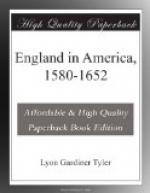Her condemnation was a matter of course, and at the end of two days the court banished her from the colony; but as it was winter she was committed to the temporary care of Mr. Joseph Welde, of Roxbury, brother of the Rev. Thomas Welde, who afterwards wrote a rancorous account of these difficulties, entitled A Short Story. While in his house, Mrs. Hutchinson was subjected to many exhortations by anxious elders, till her spirits sank under the trial and she made a retraction. Nevertheless, it was not as full as her tormentors desired, and the added penalty of dismissal from church was imposed. After her excommunication her spirits revived, “and she gloried in her condemnation and declared that it was the greatest happiness next to Christ that ever befell her.”
In this affair Winthrop acted as prosecutor and judge. Before the spring had well set in he sent word to Mrs. Hutchinson to depart from the colony. Accordingly, March 28, 1638, she went by water to her farm at Mount Wollaston (now Quincy), intending to join Mr. Wheelwright, who had gone to Piscataqua, in Maine, but she changed her mind and went by land to the settlement of Roger Williams at Providence, and thence to the island of Aquidneck, where she joined her husband and other friends.[17]
Such was the so-called Antinomian controversy in Massachusetts, and its ending had a far-reaching effect upon the fortunes of the colony. The suppression of Mrs. Hutchinson and her friends produced what Winthrop and the rest evidently desired—peace—a long peace. For fifty years the commonwealth was free from any great religious agitations; but this condition of quietude, being purchased at the price of free speech and free conscience, discouraged all literature except of a theological stamp, and confirmed the aristocratic character of the government. As one of its mouth-pieces, Rev. Samuel Stone, remarked, New England Congregationalism continued till the close of the century “a speaking aristocracy in the face of a silent democracy."[18] The intense practical character of the people saved the colony, which, despite the theocratic government, maintained a vigorous life in politics, business, and domestic economy.
[Footnote 1: Winthrop, New England, I., 70, 81, 113, 179, 185; Cal. of State Pap., Col., 1574-1660, p. 180.]
[Footnote 2: Winthrop, New England, I., 49, 63.]
[Footnote 3: Bradford, Plimoth Plantation, 370; Hubbard, New England (Mass. Hist. Soc., Collections, 2d series, V.), 203.]
[Footnote 4: Winthrop, New England, I., 145, 147.]
[Footnote 5: Eggleston, Beginners of a Nation, 282.]
[Footnote 6: Winthrop, New England, I., 163, 166, 180.]
[Footnote 7: Winthrop, New England, I., 188, 193, 198, 204, 209, 210.]
[Footnote 8: Mass. Hist. Soc., Collections, 1st series, I., 276.]




